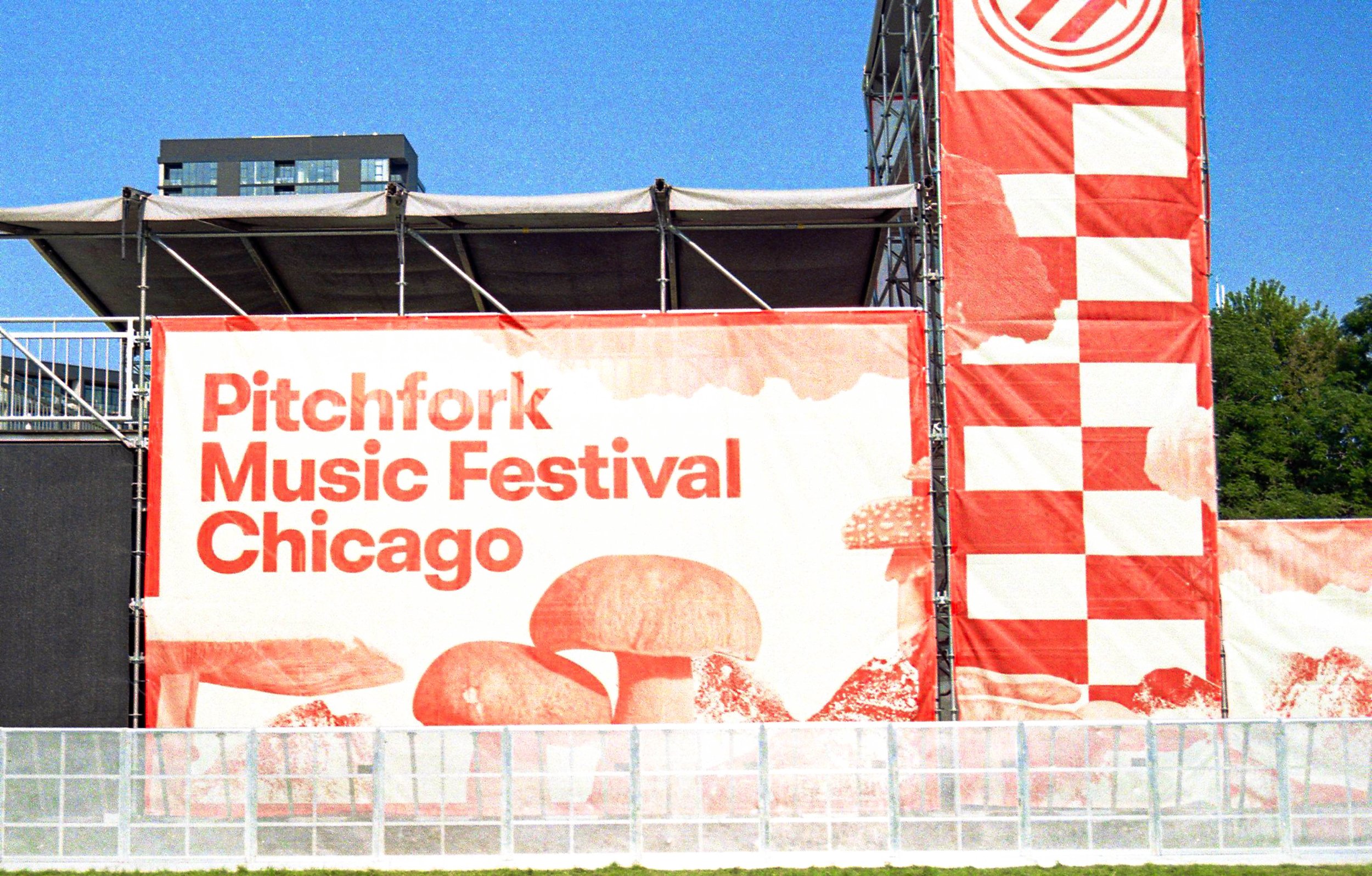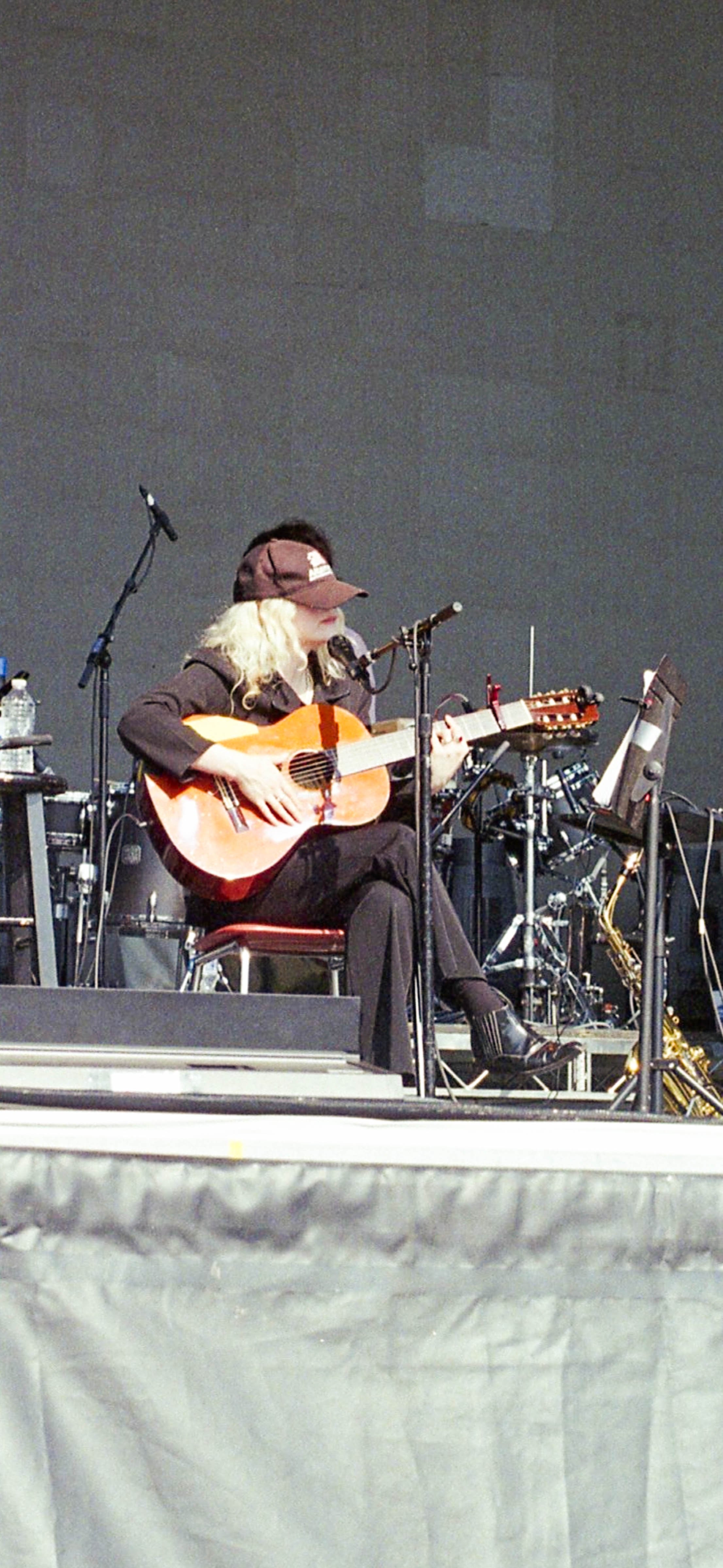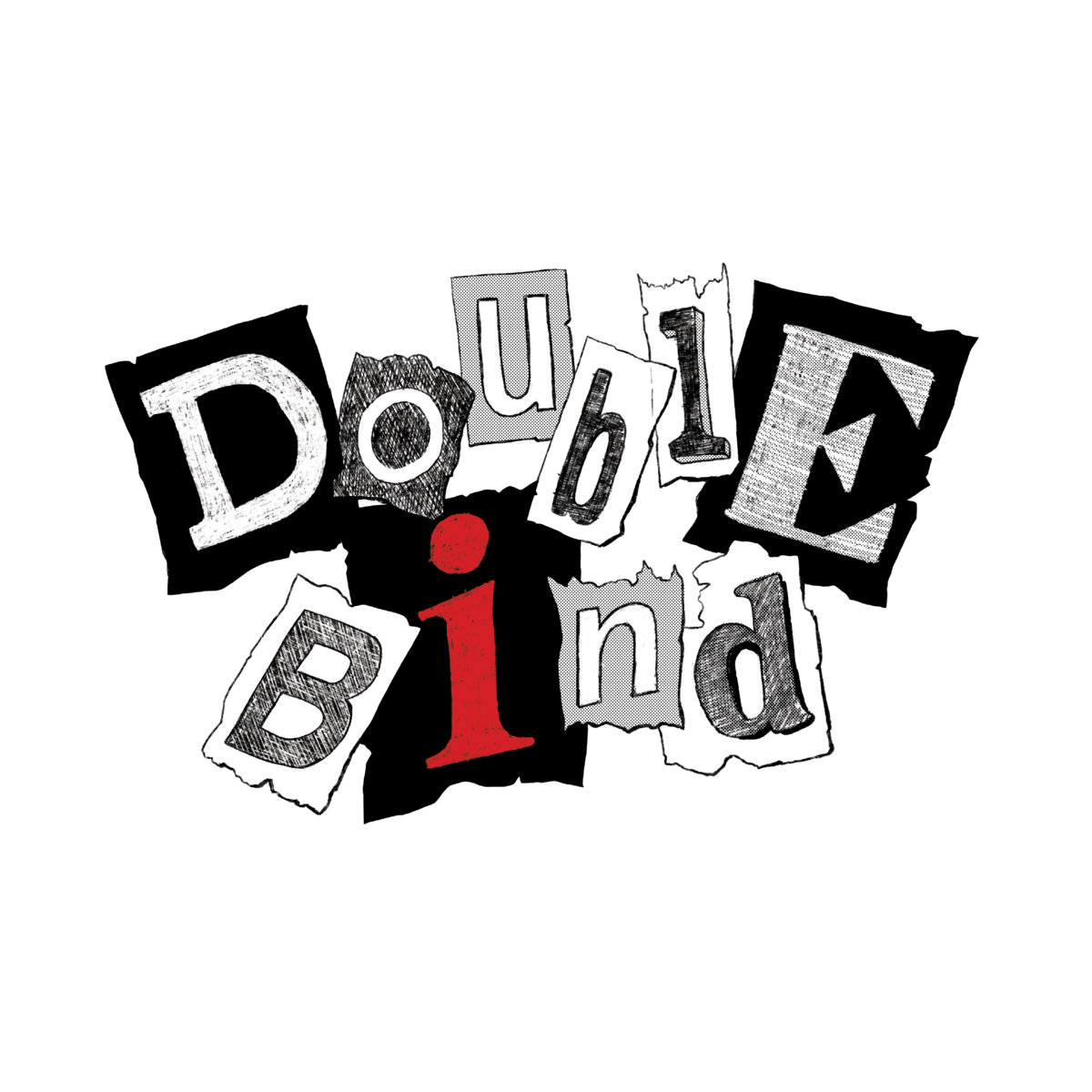Pitchfork Music Festival 2024 Recap
/As far as music festivals go, Pitchfork tends to be one of the better ones. It may not be as gargantuan as Lollapalooza, as buzzy as Coachella, or as tapped-in as Rolling Loud, but you know what Pitchfork has that most other festivals don’t? Identity.
For better or worse, Pitchfork is a festival designed around one of the world’s most influential music publications and the particular tastes of its readers. Since this festival is centered around such a longstanding entity, the lineup tends to be more curated and intentional than other festivals which often fall into the trap of trying to be everything to everyone. Sure, it’s easy to look at lineups for bigger festivals and imagine how cool it would be to see Megan The Stallion, Deftones, Ethel Cain, and blink-182 in the same place, but in practice, it’s sweaty, messy, overpriced, and you rarely get to “see” many of those artists in a genuine way.
In contrast, Chicago’s Union Park also translates to a near-perfect festival layout, converting its 13.5 acres of grassy fields and tree-lined borders into wide-open spectacles and tucked-away stages that each feel like distinct areas. There’s ample room for the festival’s three main stages, food vendors, beer tents, merch stations, record stores, local artists, companies handing out free tchotchkes, and a smaller side stage dedicated to artist interviews. It can get pretty packed, but it’s never that hard to traverse, and you can generally get a pretty great view of any artist’s set, especially if you plan ahead a little bit.
Location aside, the “indie”-leaning lineup of Pitchfork feels like it typically strikes a nice balance between up-and-coming bands, recent breakthroughs, and more enduring legacy acts of all genres. This year, the top-level headliners closing out each day were Black Pumas, Jamie xx, and Alanis Morissette. Directly beneath them, you had artists like Jai Paul, 100 gecs, Carly Rae Jepsen, and MUNA, all legendary projects to a very specific type of person. I personally was excited for Saturday’s shoegaze gambit, where the schedule flowed from Hotline TNT to Feeble Little Horse and Wednesday, each stacked one after the other like the promoters took a page directly from my Spotify Wrapped.
I’ve only attended one other Pitchfork Music Festival in 2022, so I was eager to return and see what’s changed in the last couple of years. Going in, I was interested in how Pitchfork’s recent fusing with GQ under Condé Nast would impact the vibe, if at all. Truthfully, I wasn’t planning on until Swim Into The Sound’s own David Williams approached me with a behind-the-scenes photo pass, and I didn’t want to miss out on that opportunity. Below, you’ll find thoughts from me, David, and Logan Archer Mounts on the weekend, along with David’s photography, all shot on 35mm film for maximum coolness.
Day 1
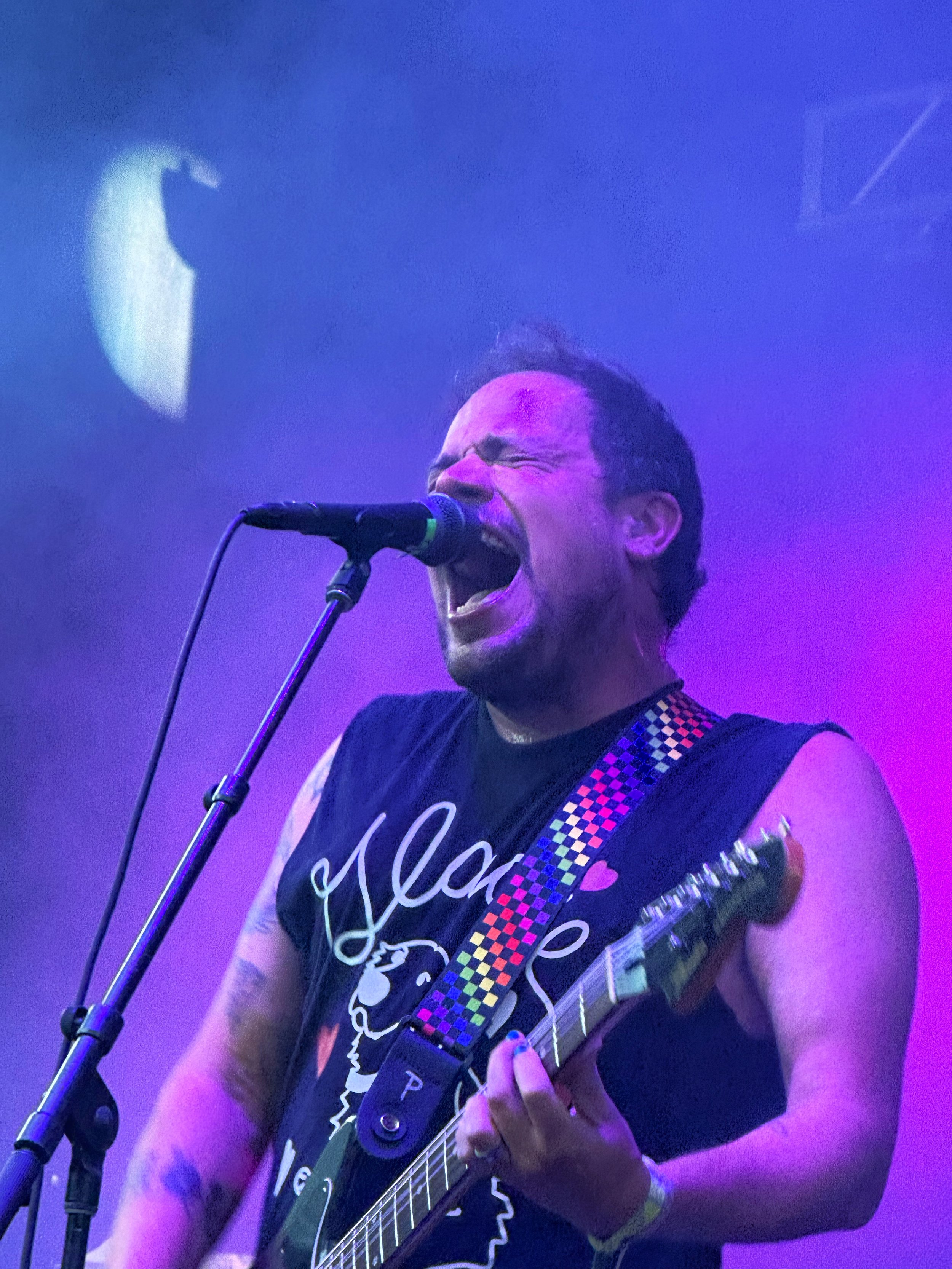
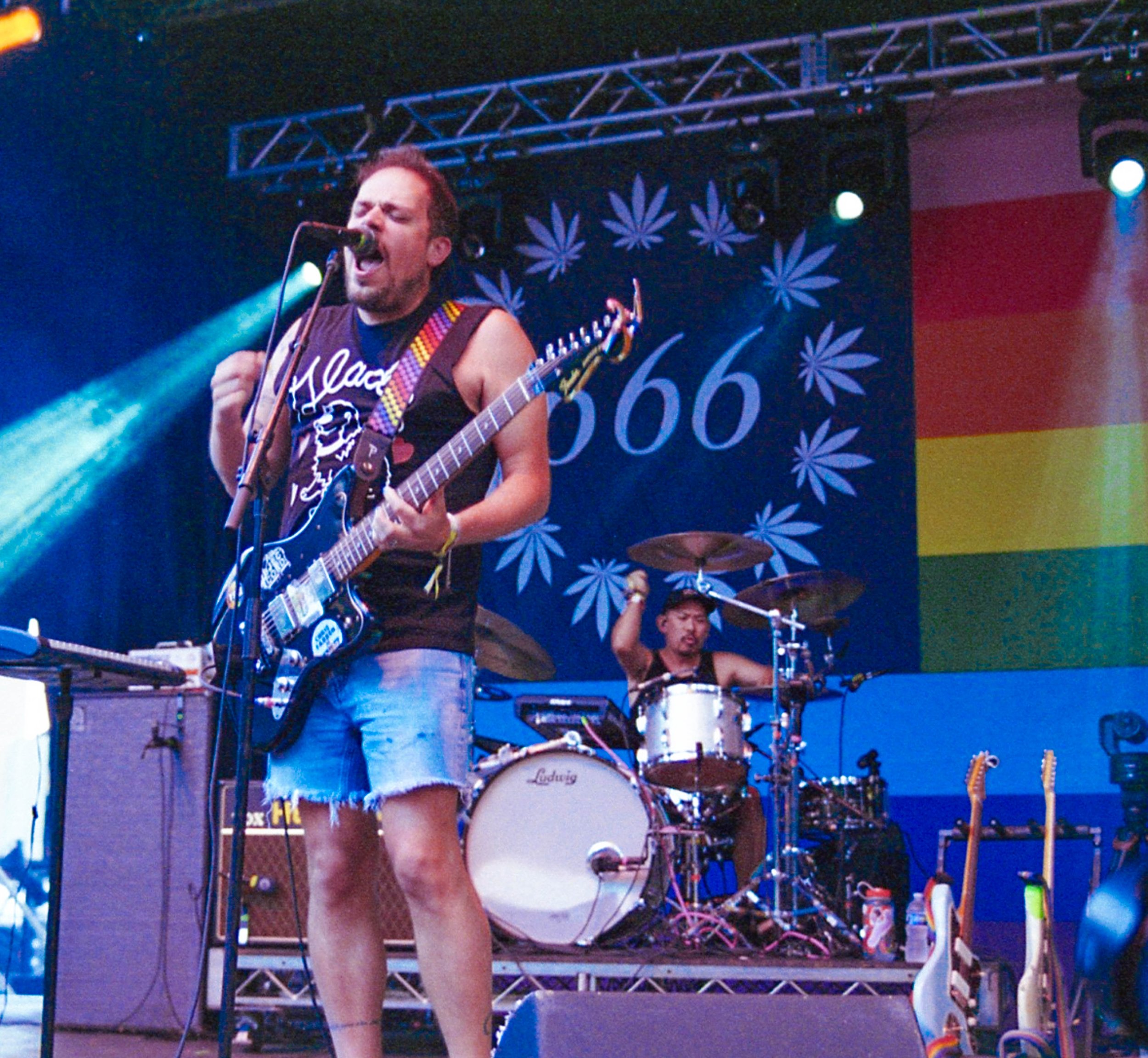
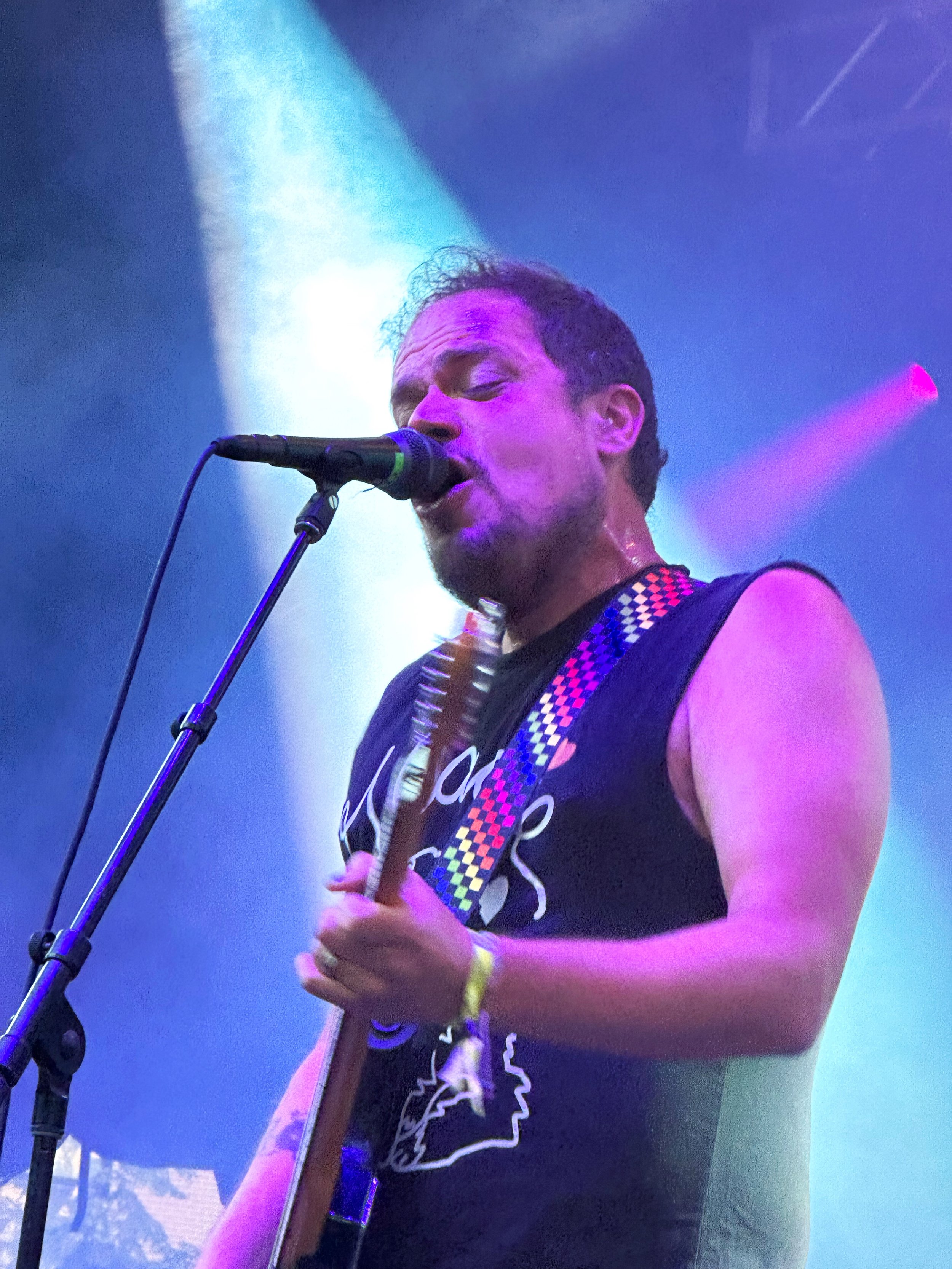
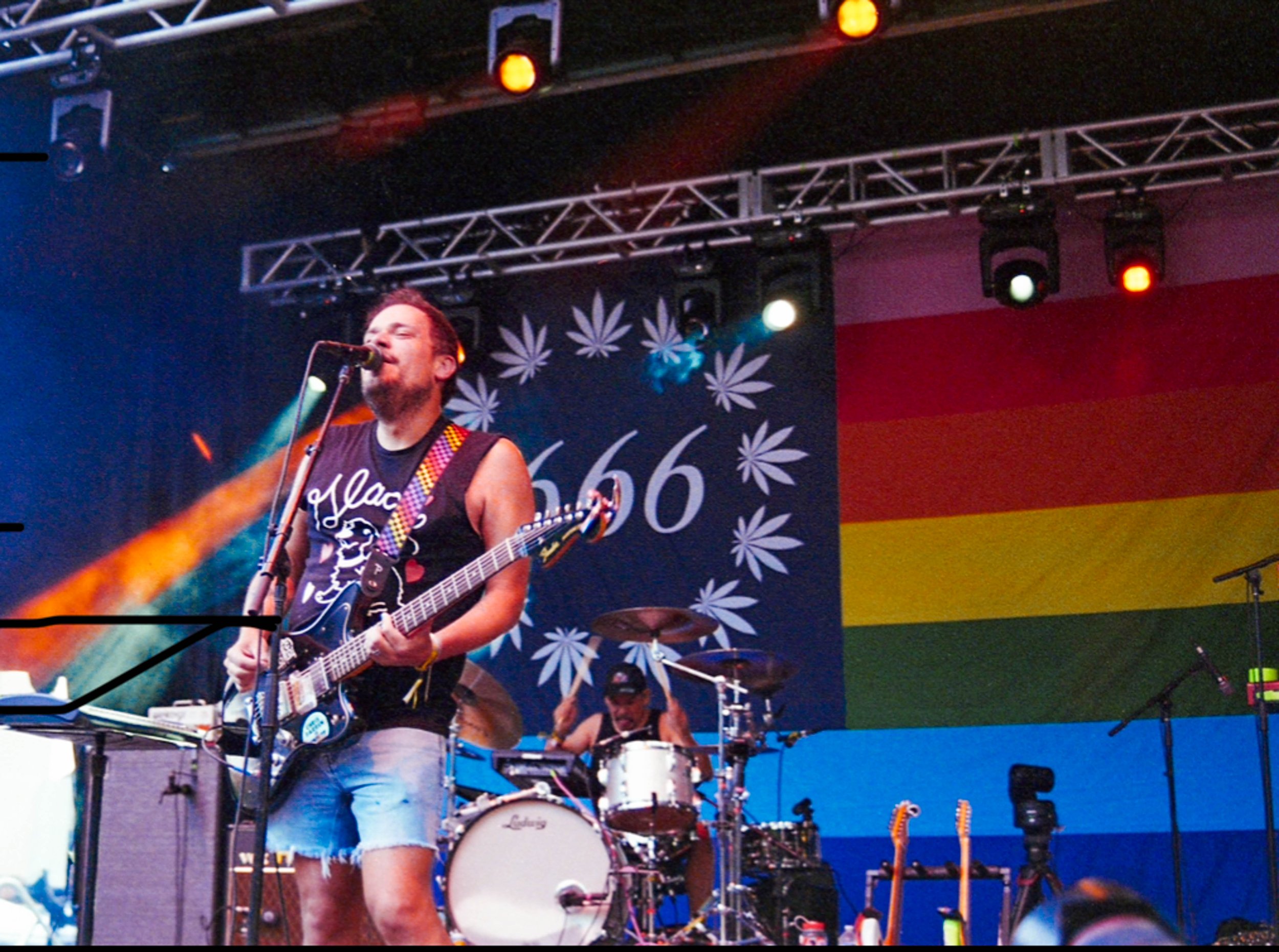
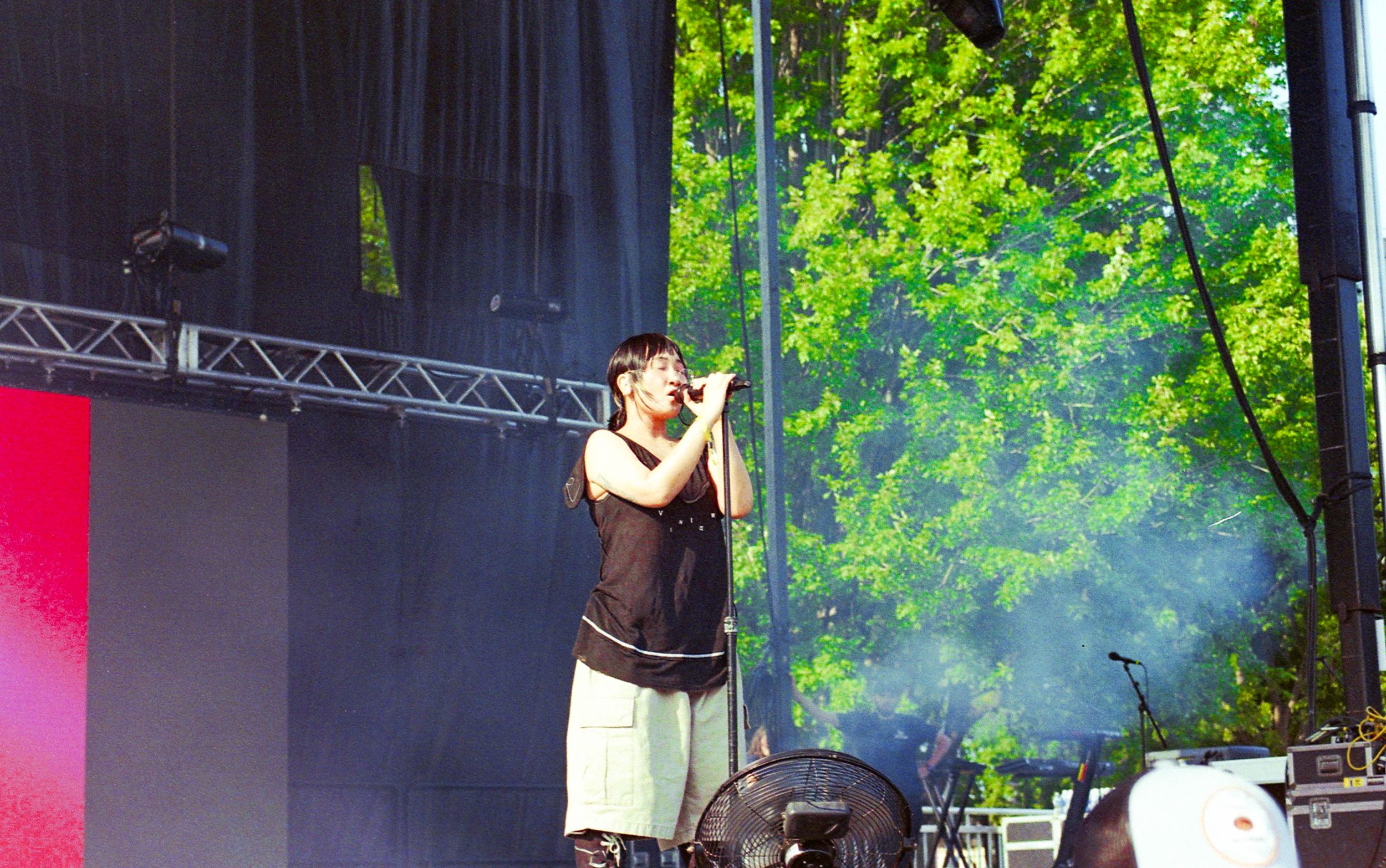
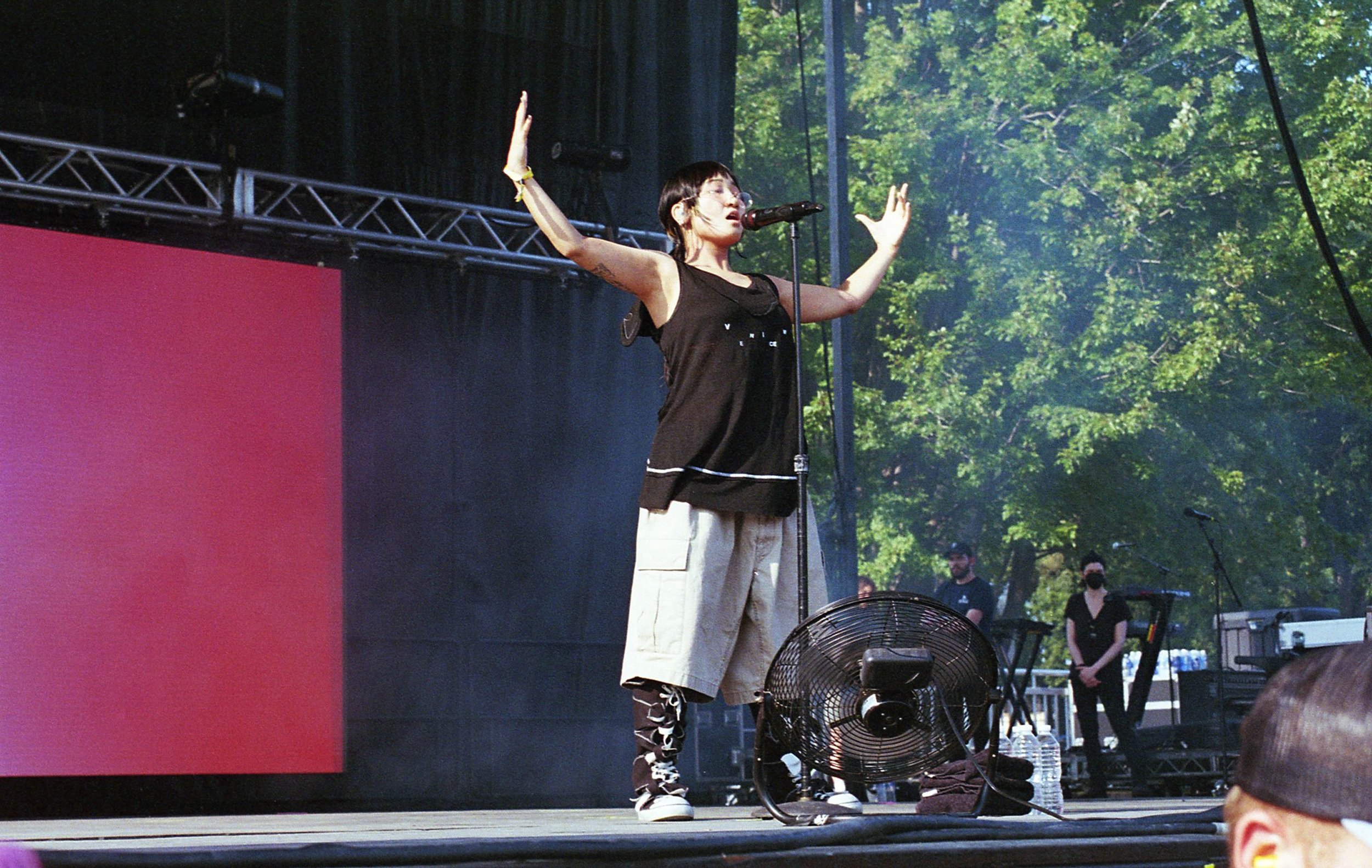
My group ambled into Union Park at 1 pm on the dot, right as the first band was ramping up. The fields were empty, the sun was out, and all the vendors were at the ready with beer and hot dogs. It’s always fun to see festival grounds like this before they get trampled in and filled out by the crowds; there’s a sense of boundless possibilities knowing that three full days of live music await you. Black Duck prattled through a jazzy improvised set that felt like a nice way to roll into the day with relaxed vibes. Angry Blackmen were true to their name, bringing an aggro hip-hop energy that felt like it properly set the festivities off before ML Buch took us to gazy dreamland.
Rosali was one of the first acts on the lineup that I was actively excited for; her album from earlier this year is excellent and has one of the most striking covers of 2024. Exactly as I had hoped, Rosali brought the homespun southern rock vibes, with her backing band locked in for a couple of inspiring jams, including a particularly rousing version of “My Kind.” The group closed their set with “Rewind,” an absolutely undeniable song that was joyful to watch unfold live on stage after being obsessed with it since January.
After a quick lunch break (aka paying $20 for a chicken wrap), I caught slices of Billy Woods, Amen Dunes, and Sudan Archives, each of whom had their own commanding presence. Billy Woods and Kenny Segal kept the crowd on their toes with off-kilter beats and urgent lyricism while Sudan Archives strutted through a solo set of hip-hop-infused R&B, pulling out her violin at key moments and shredding a melody before sheathing it and returning to vocal duties.
Back in May, we published a review of Amen Dunes' most recent album, which I quite enjoyed but leaned in a reserved, ambient direction. I was surprised to see him playing with a full band and playing such “band” type songs. Their whole set was super fun, oscillating between a DIIV-like grooviness and slightly more upbeat numbers that sounded almost like Future Islands.
Yaeji graced the Red Stage with a theatrical performance shelving out hit after electronic hit during the tail end of day one. Dressed in Shaq-sized cargo shorts and a black tank top, Yaeji moved and grooved through the summer sun with ease. Her blend of R&B, techno, and synth-pop had everyone’s attention the moment she started her set. The crowd erupted when one of her biggest hit songs, “Raingurl,” bled through the speakers, sparking an impromptu dance-off among the fans.
– David Williams
Yaeji to 100 gecs was a pretty lateral move, but definitely brought the Friday Energy that we needed and helped make it feel like the party was really starting in earnest. I watched about half of the 100 gecs set and realized I barely knew their latest album. I still enjoyed seeing “stupid horse” live and will admit that I got full-body goosebumps during the chorus of “Hollywood Baby,” but the set could only feel so “big” given that it was just two people playing songs off a computer. It's still cool to see 100 gecs live after following them for so long, but I’m not sure their set quite hit it home for me.
I didn’t watch all of Jai Paul’s set, but I did walk by Red Stage just to see the man in the flesh with my own two eyes. I had places to be, specifically catching Jeff Rosenstock’s set over on the blue stage, which was exactly as energetic, shouty, and boisterous as any Jeff Rosenstock set I’ve ever witnessed. The crowd was jumpin, Jeff crowd-surfed while playing sax, and I ate a Chicago dog while taking it all in, a great way to cap off day one.
I left before Black Pumas started playing both because I didn’t care to catch their set but also because I was headed over to Subterranean to catch Hotline TNT’s aftershow, which was more like a pre-show since they were playing the next day. I watched the opening band, Graham Hunt, from the upper-level balcony, and then I was able to make it right up front for Hotline’s set, which was a swirling delight of hypnotic riffs and loud-ass guitars. I was beyond tired at the end of day one, but it was worth it to see a band like that play an entire set from less than ten feet away.
Day 2
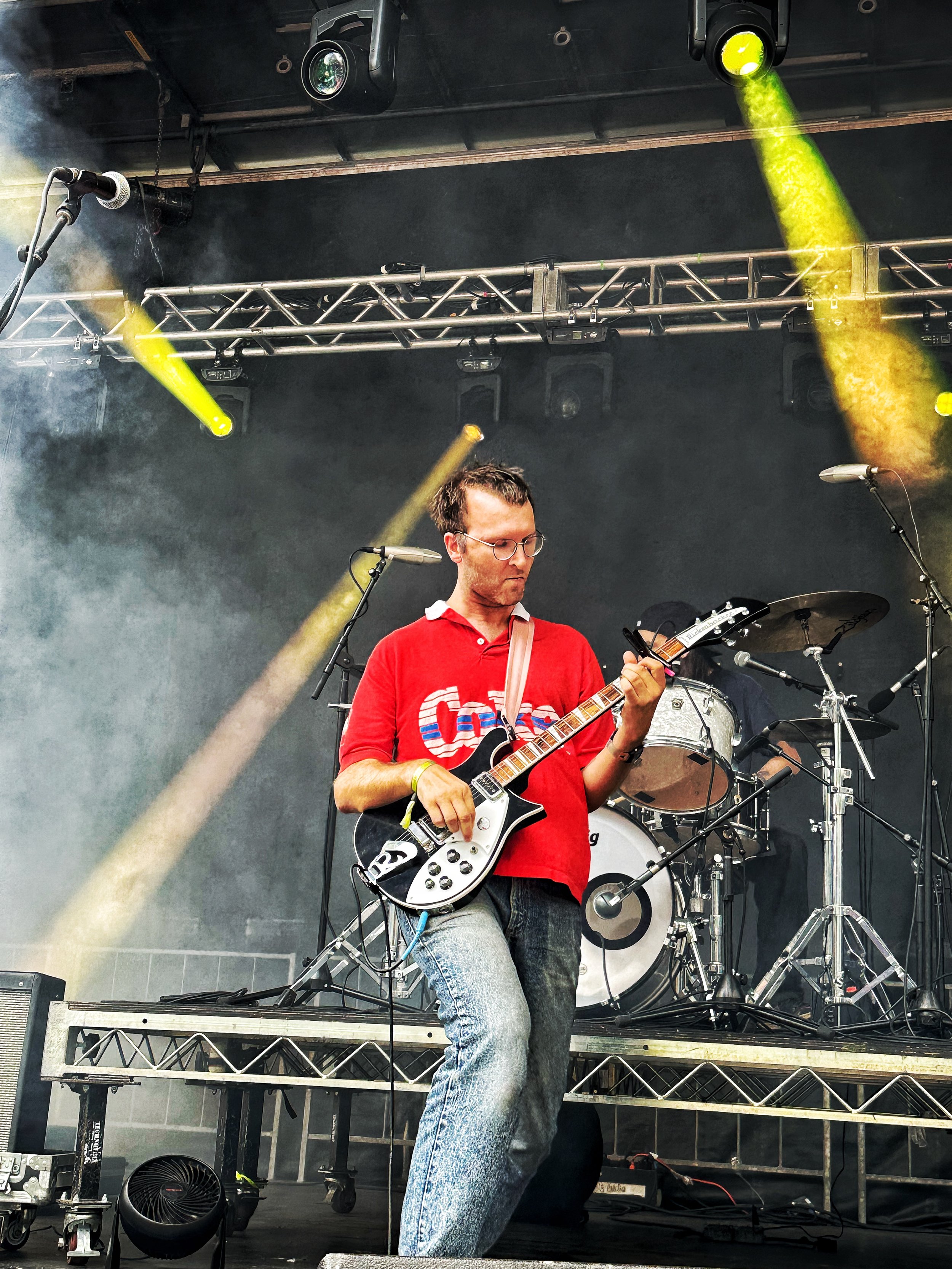
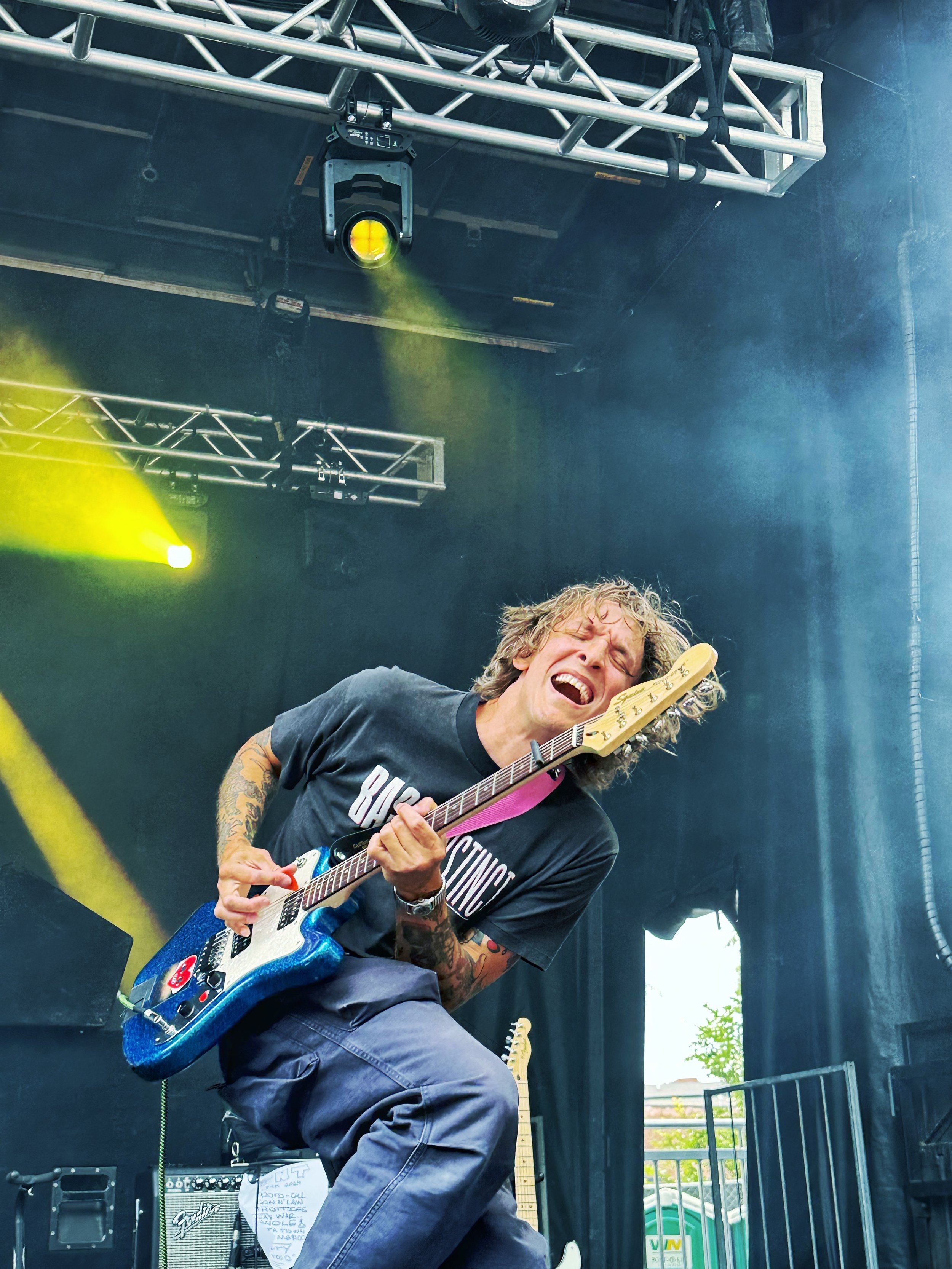
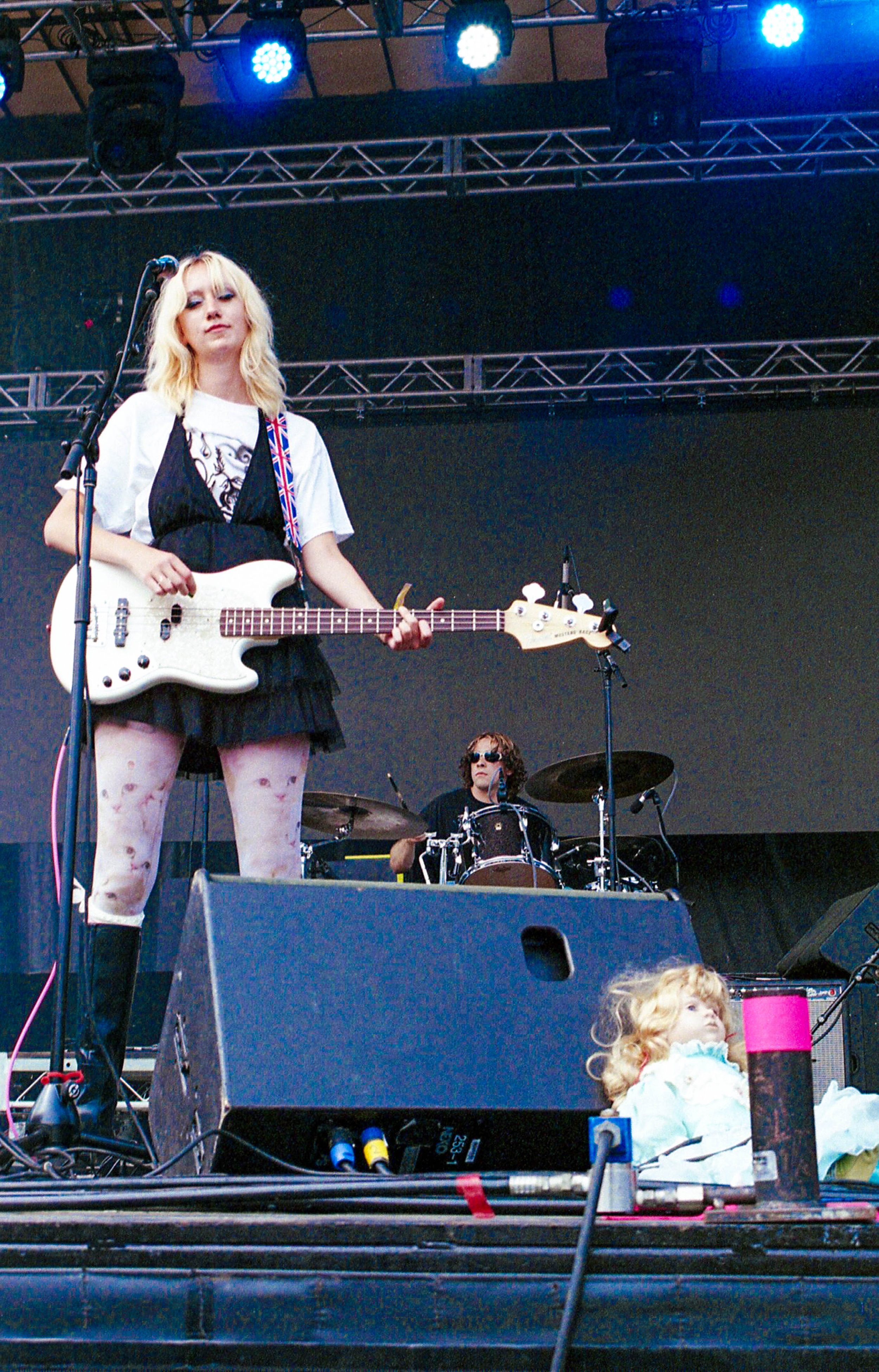
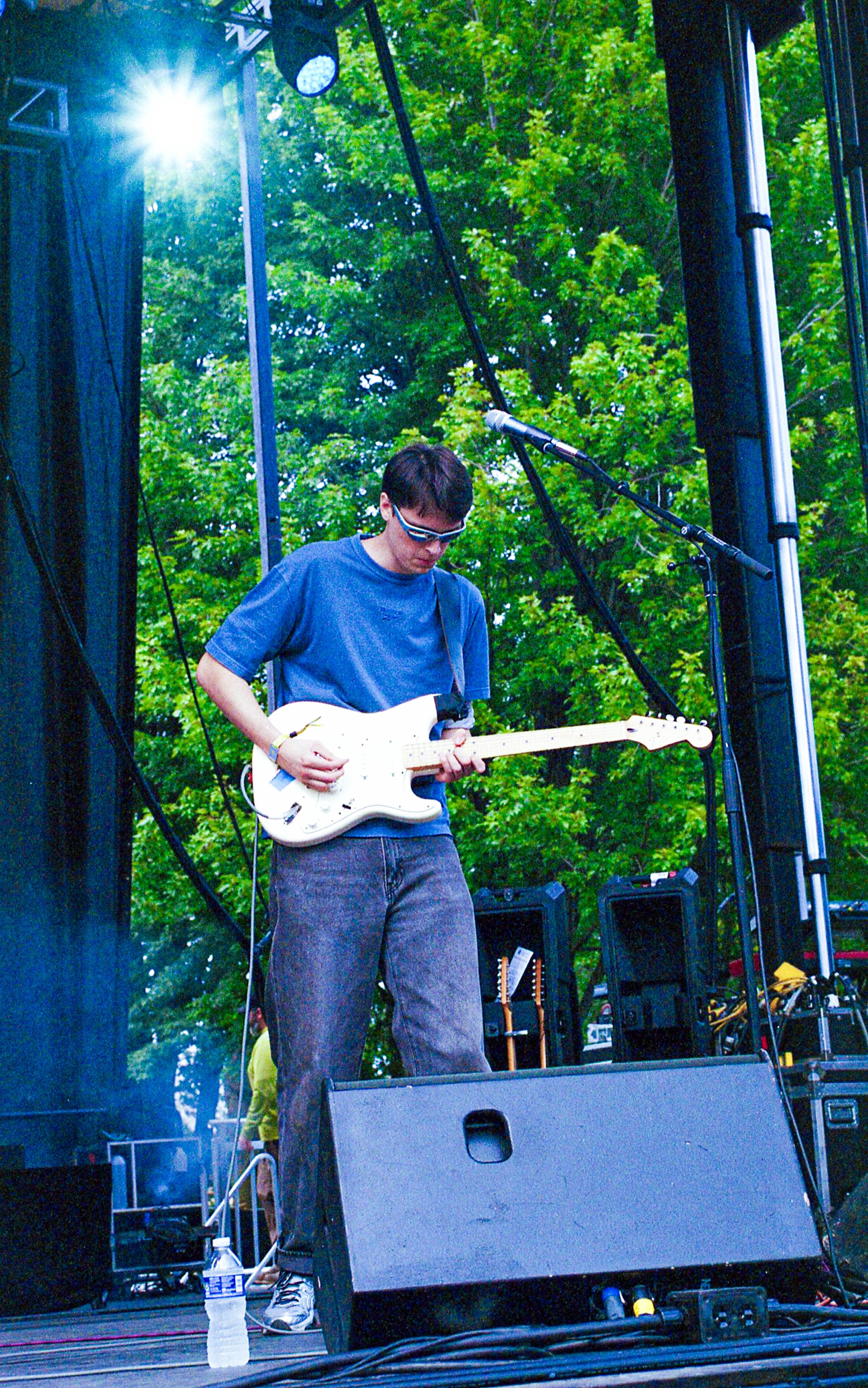
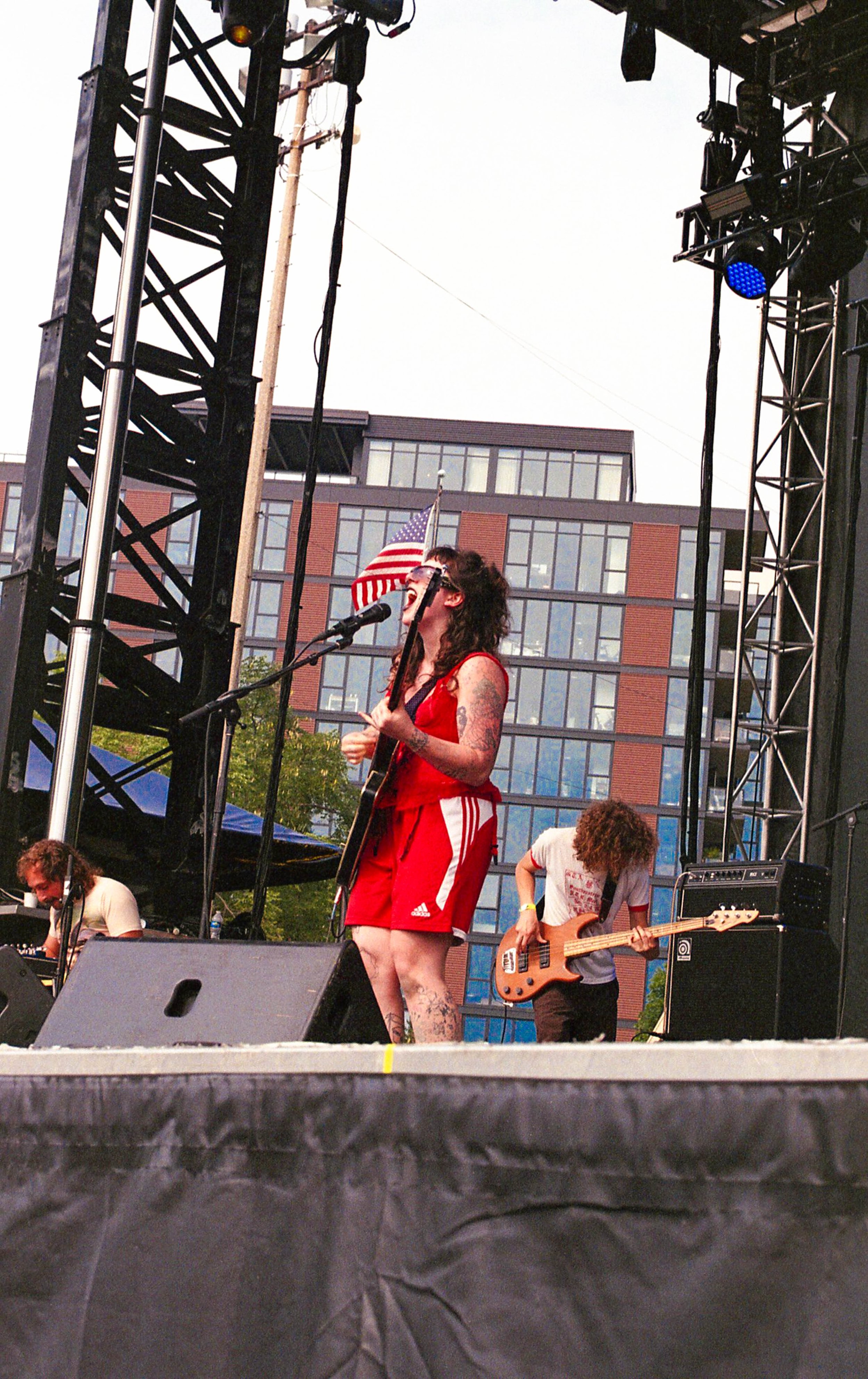
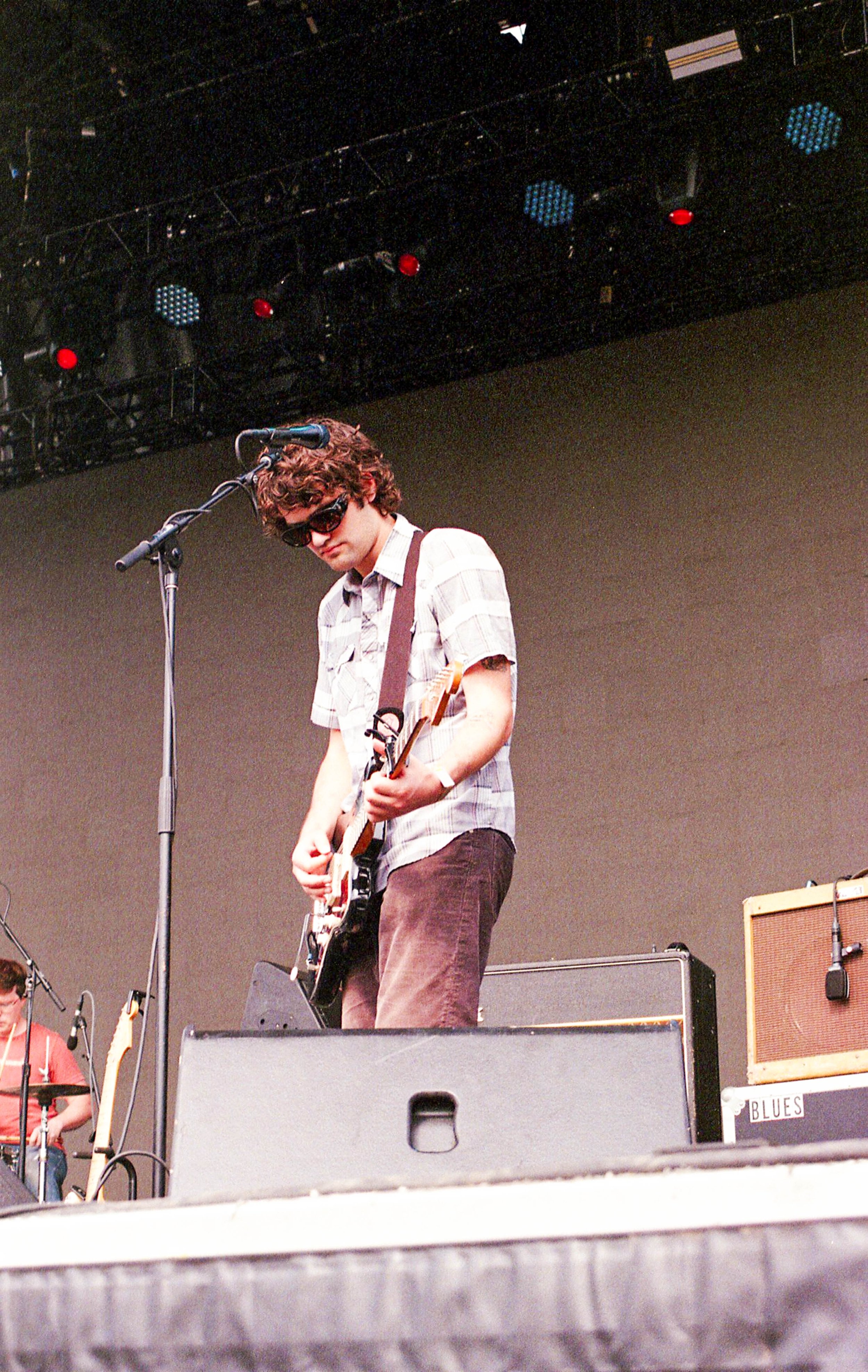
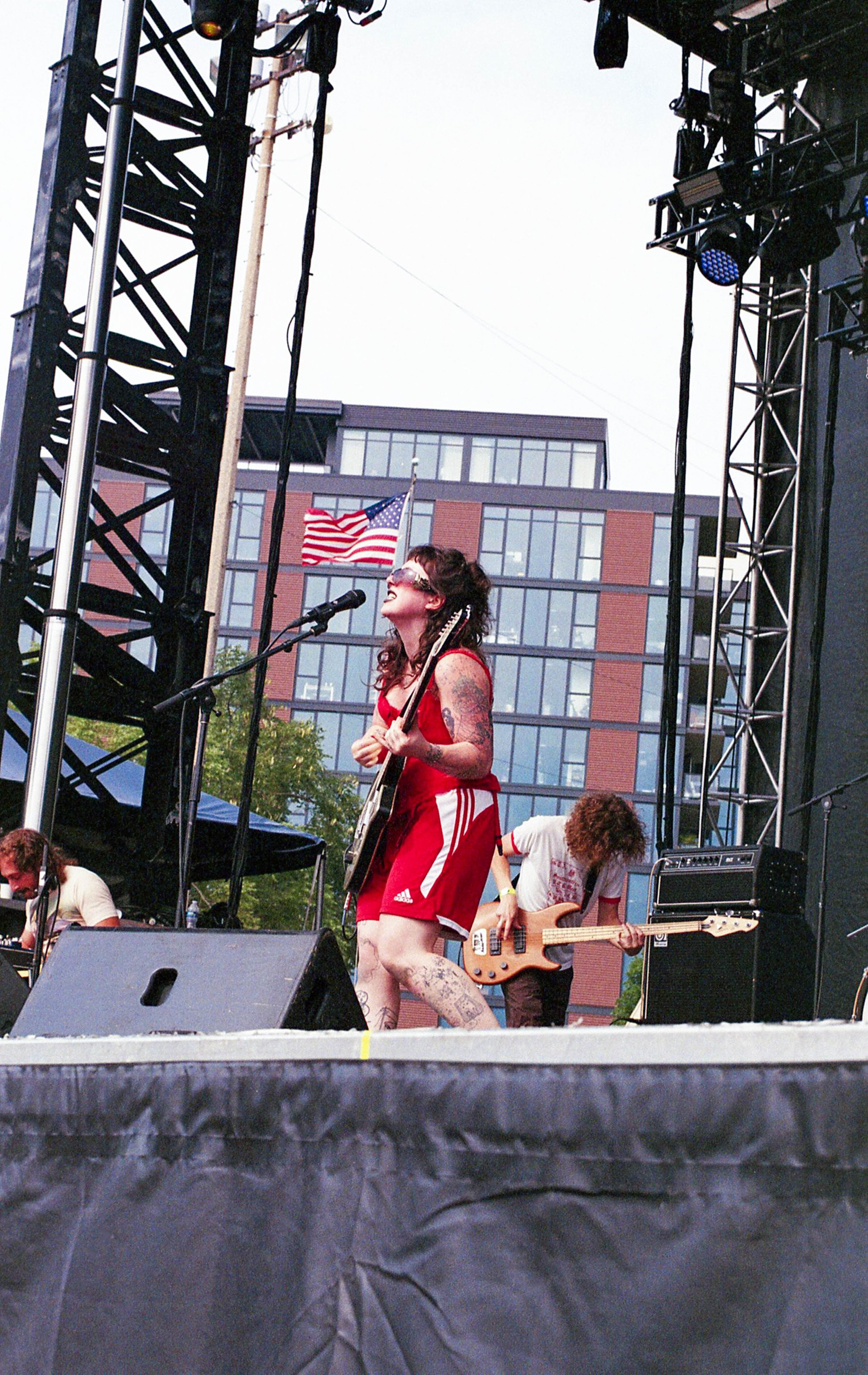
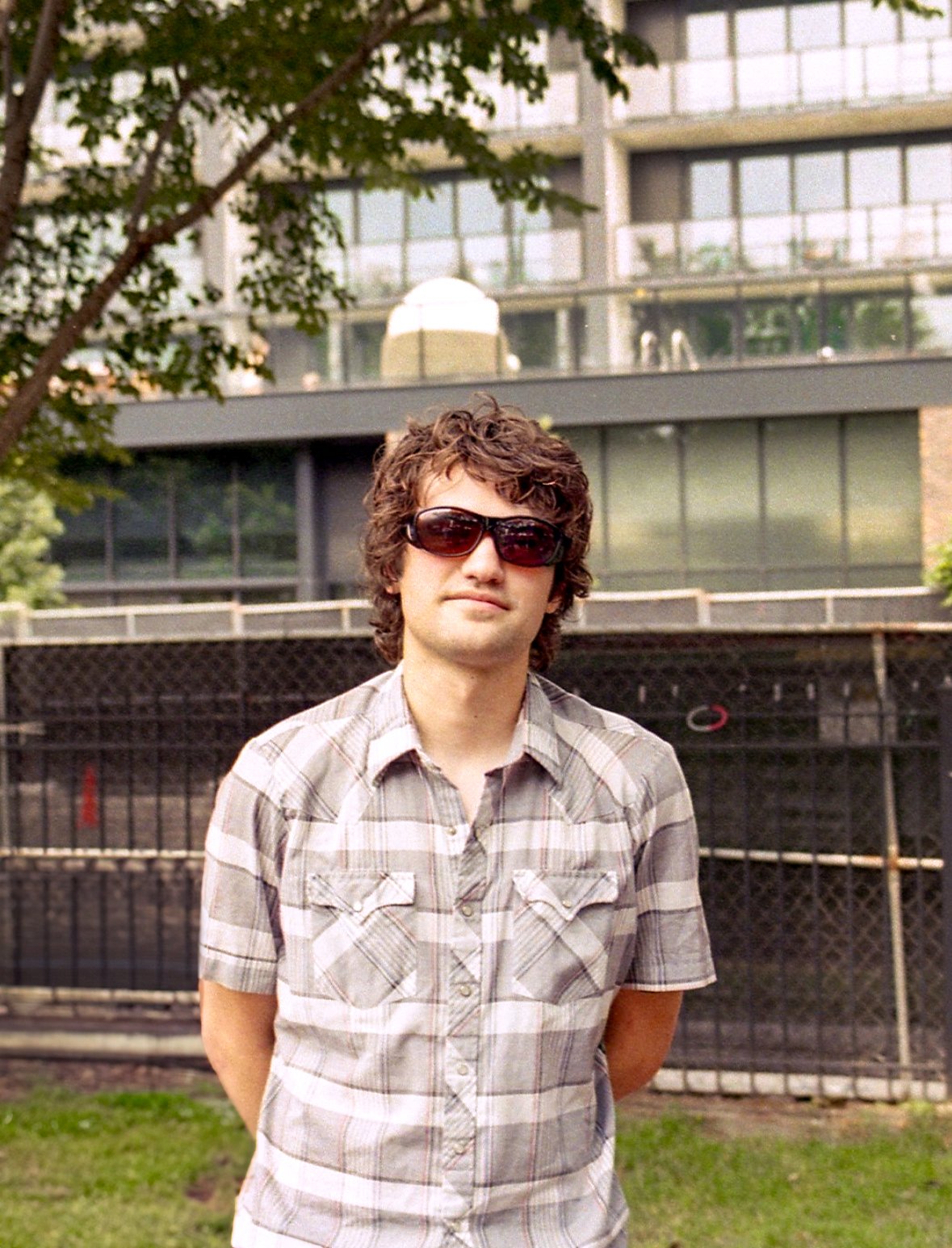
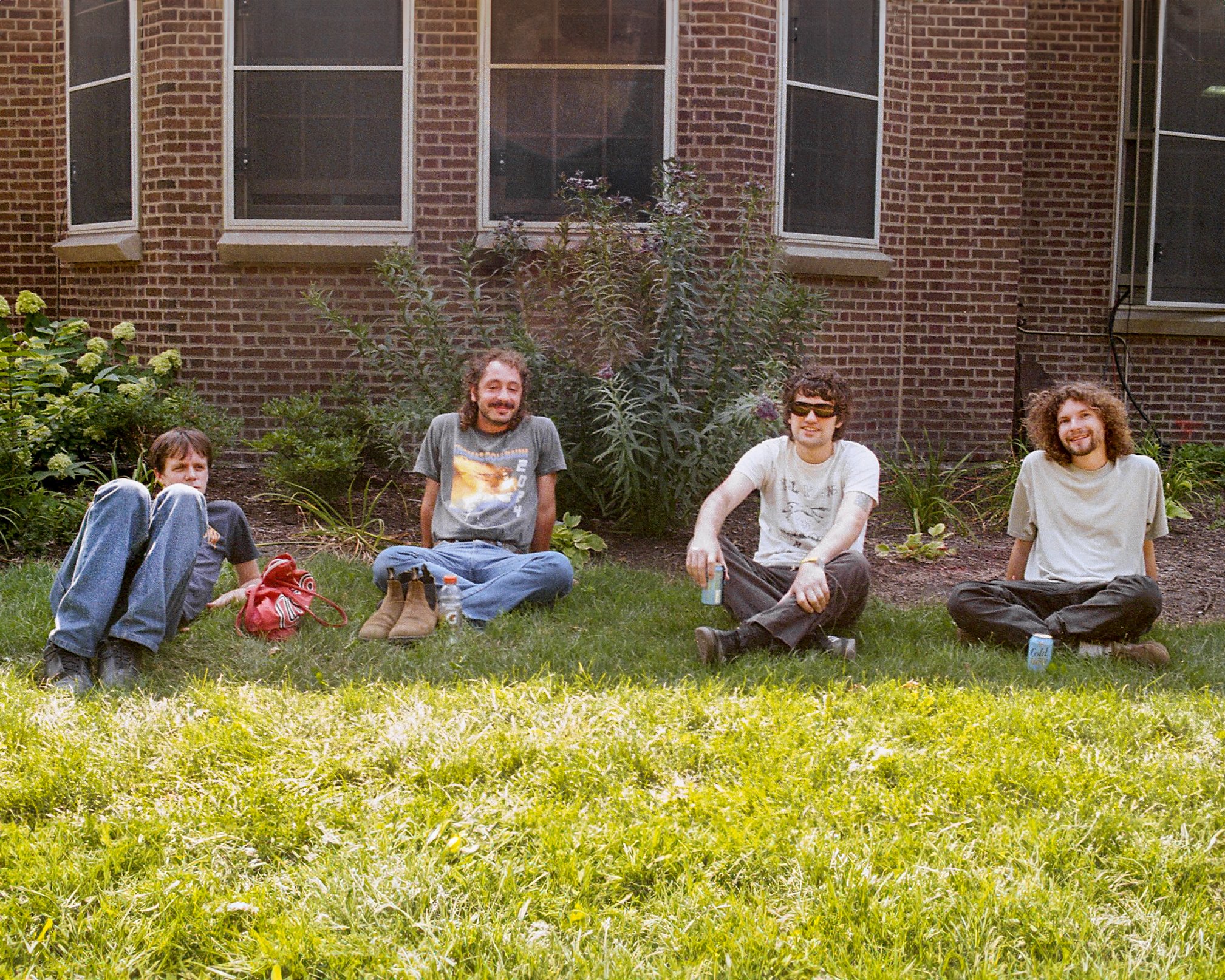
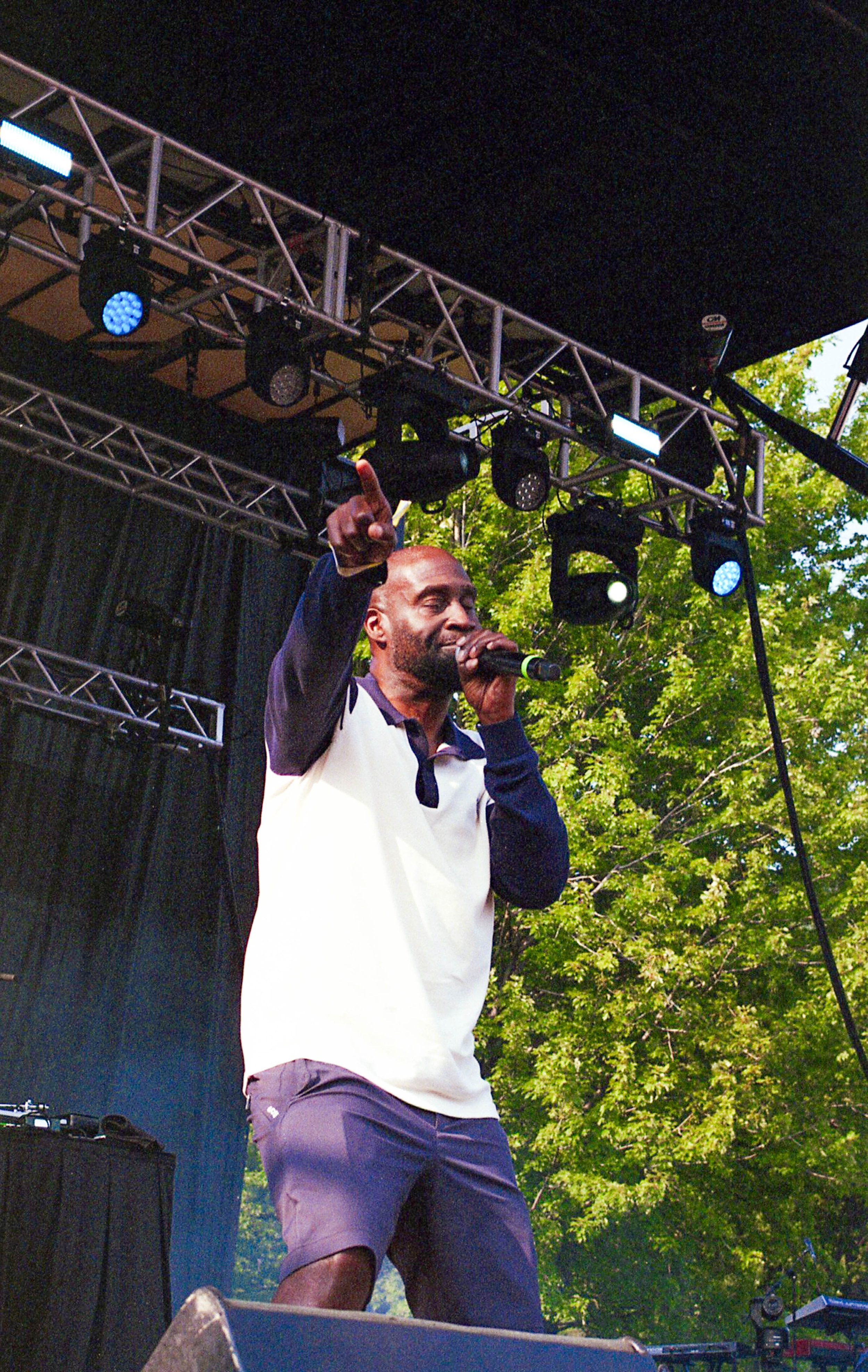
Chicago’s own Lifeguard kicked off day two with the sort of youthful energy only achievable by a group of kids still approaching their twenties. At various points, the trio shifted around from a traditional lineup of guitar, drums, and bass to drums and two guitars, all rendered in an impressive and jagged post-punk style. The lead singer, Kai Slater, was on crutches, so he played the entire set seated, but with that loss of mobility came the opportunity to use one of his crutches during a solo, which was a helluva way to start things off as we sipped on our free coffee.
I caught parts of L’Rain and Kara Jackson before Saturday’s shoegaze onslaught. L’Rain brought the dreamy vibes with lots of slow post-rock builds, mellow beats, and gorgeous vocals layered on top of everything. I only caught a song or two from Kara Jackson, but they were jaw-droppingly beautiful. At one point, she interpolated SZA’s “Love Galore,” and the crowd let out a “Woo!” of recognition.
Starting at 2:45, Hotline TNT rocked reliably, fusing together into one giant mass of riffage, and even broke out a few songs that they hadn’t played the night before. The crowd was consistently swaying and head-bobbing but didn’t seem to erupt into the same type of chaos I had witnessed at Subterranean, presumably because people were saving their energy for the rest of the weekend.
Feeble Little Horse were wild to see in concert after feeling like they were on the brink of breaking up after an untimely hiatus right as they dropped their second album. It was still too close to Black Country, New Road’s shakeup, and fans were bummed but understanding as we wished the band the best and hoped for their eventual return. Seeing a song like “Chores” live was an experience; there are so many janky little beats and knotty twists in their songs, it was impressive to see them break that all out live. At one point between songs, the guitarist stepped up to the mic and said, “These are songs from an album Pitchfork gave a seven,” which got a laugh from the crowd before he continued incredulously, “We’re like, ‘why are we here?’ Why do they want us?”
At one point, we were halfway through Feeble Little Horse’s set, and I was glimpsing over my shoulder to see Wednesday sound-checking on the Green Stage and felt like I was in my own personal slice of heaven. To be sandwiched between these two bands I’ve been listening to obsessively for years was almost too much for my brain and brain to compute.
Shortly after that, Wednesday ripped through a scorching set of career-spanning material, rolling through songs from all three of their albums, plus a Drive-By Truckers song thrown in for good measure. They played a few new songs and lightly teased their upcoming album in an interview directly after the set, with Karly stating she’s even more proud of this batch of songs than their last but promising it very much feels like a continuation of Rat Saw God. Of course, the North Carolinians ended their set with the titanic “Bull Believer,” allowing the audience a chance to air out any anger and frustrations they might have had at that moment, either with life or just the state of the world. It was cathartic, it was twangy, it was beautiful.
De La Soul’s set was a celebration for hip-hop, and as DJ Maseo yelled over the microphone, “40 years of friendship!” Legendary rap group gave the crowd exactly what was advertised with a nostalgic trip down memory lane, performing their biggest hits, “Potholes in My Lawn,” and my personal favorite, “Me, Myself and I,” courtesy of the film Good Burger. Surprise guests Talib Kweli and Pharoahe Monche kept the crowd jumping nonstop. Posdnuos made it a point to tell the fans in attendance that it was his duty to bring it for them every night. De La Soul lived up to that reputation tenfold.
– David Williams
Between sets, I got to chat with MJ Lenderman and capture his portrait in 35mm film, which I like because the photos look cleaner and more classic. Film is timeless; there's a reason why movies today still look better shot in 35mm instead of digital. The portraits of him and the band give a vintage feel that, if you didn’t know better, you might not know if the photo was taken yesterday or 30 years ago. Lenderman's reputation of having an everyman demeanor was right on the mark as he couldn't have been a more gracious and friendly guy as he put up with my silly questions like "Who's your all-time favorite wrestler?" (Rey Mysterio and Mick Foley) or "What ‘dumb hat’ were you singing about that drew so much ire in "Taste Just Like It Costs?" (A golf visor). Truly a hat so hideous that it’s worthy to be sung about with such disgust.
– David Williams
After screaming it out to Wednesday and catching Karly Hartzman’s post-set interview, it was time for a pulled-pork sandwich and Bratmobile, who brought hearty doses of Pacific Northwest riot grrrl energy. After that vent session, it was time to get a good spot for The Queen, aka Carly Rae Jepsen. We scootched up as close as we could comfortably get while still having ample room to dance and jump around for a solid hour as Carly jumped from one sugary confection to the next. I had seen her back in 2019, and this set was just as elating and life-affirming as the one I saw five years ago.
Day 3
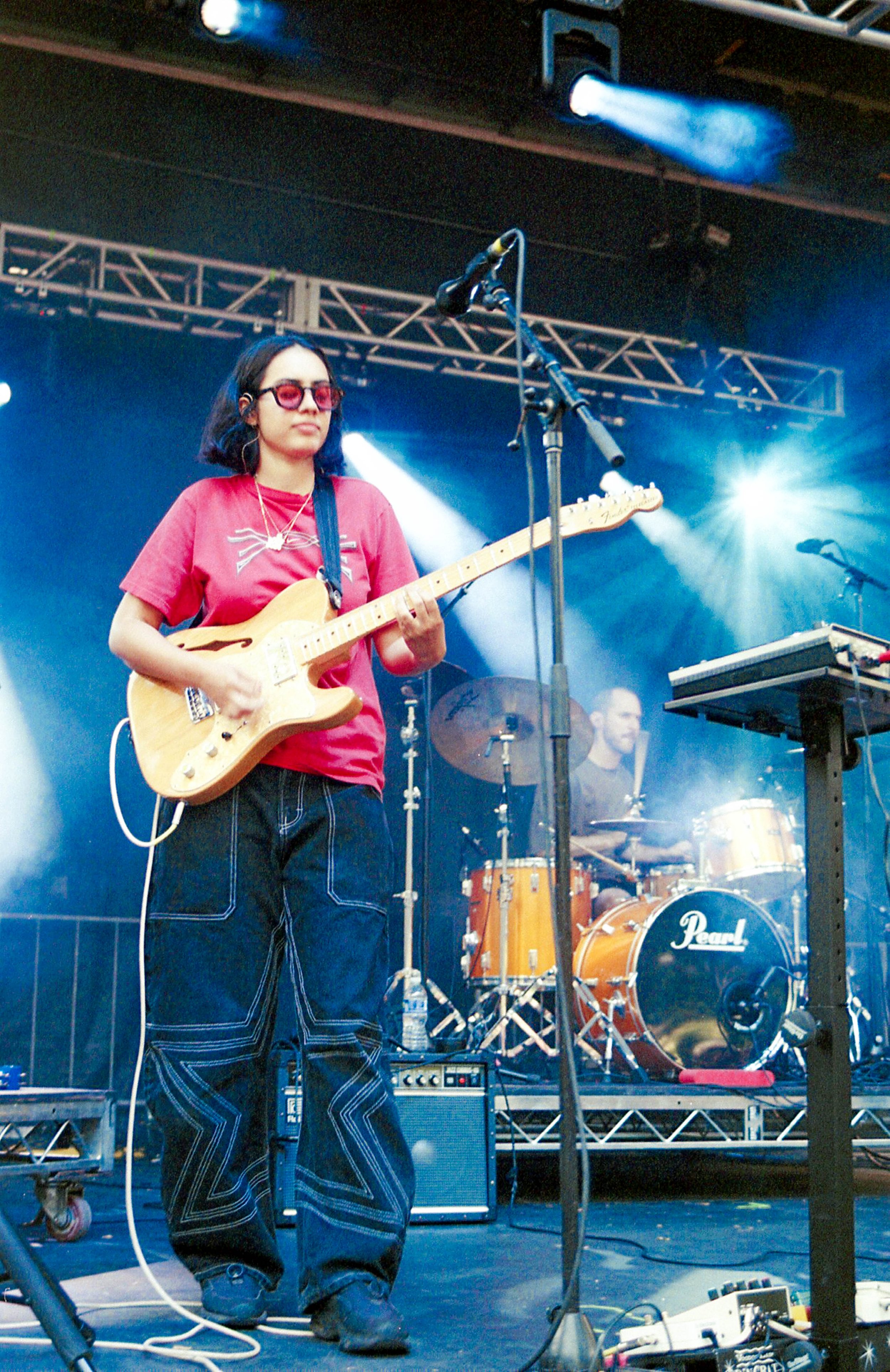
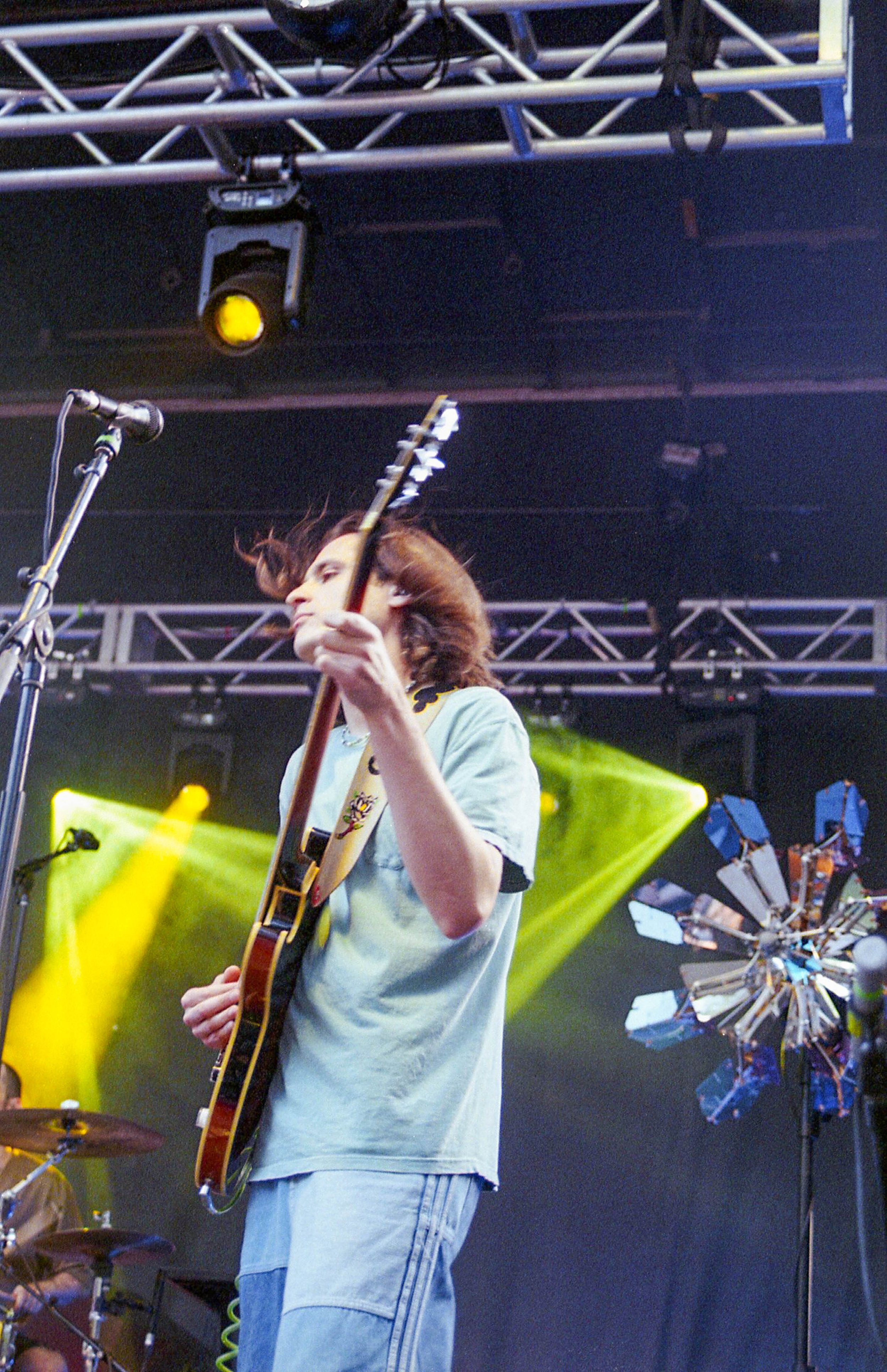
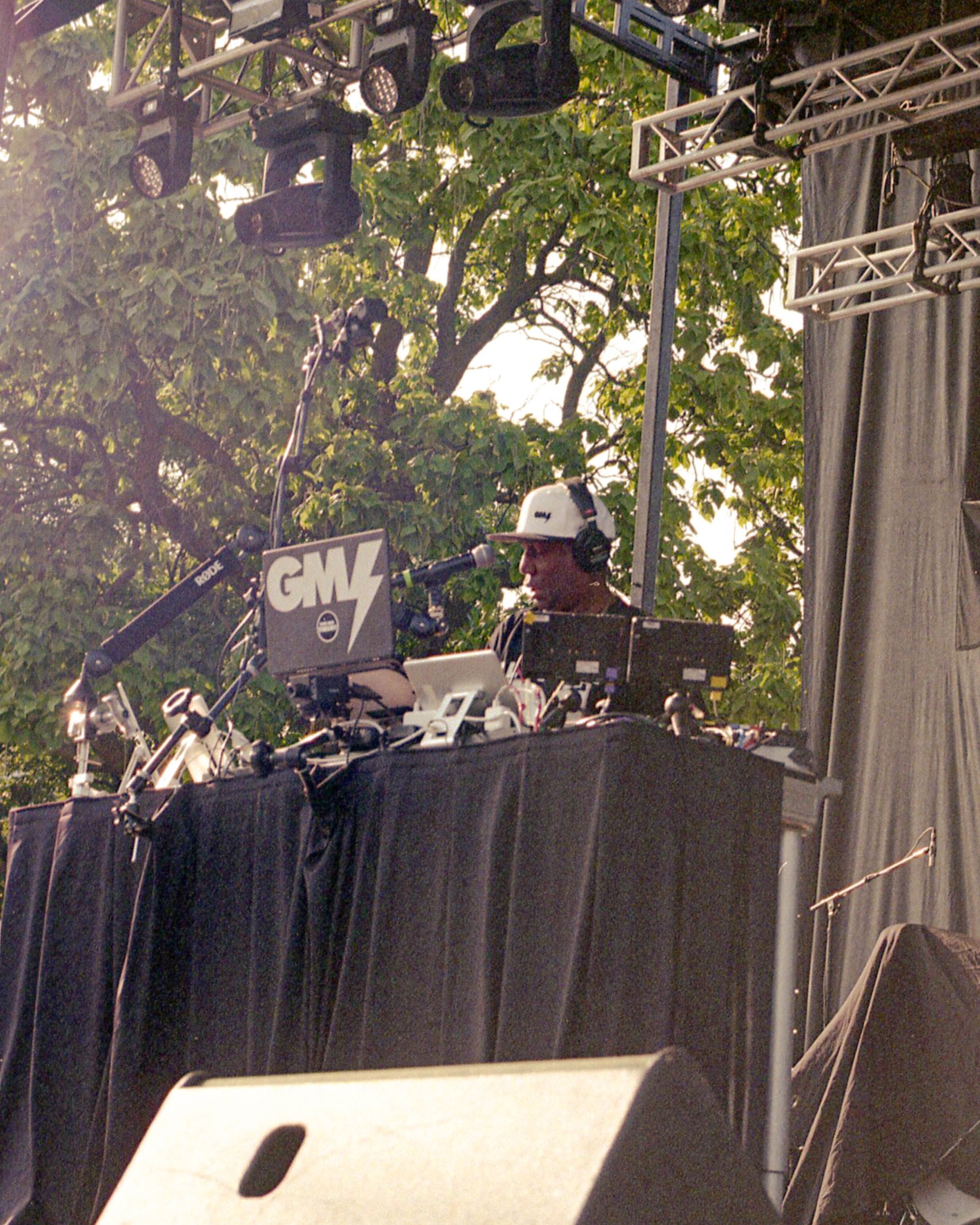
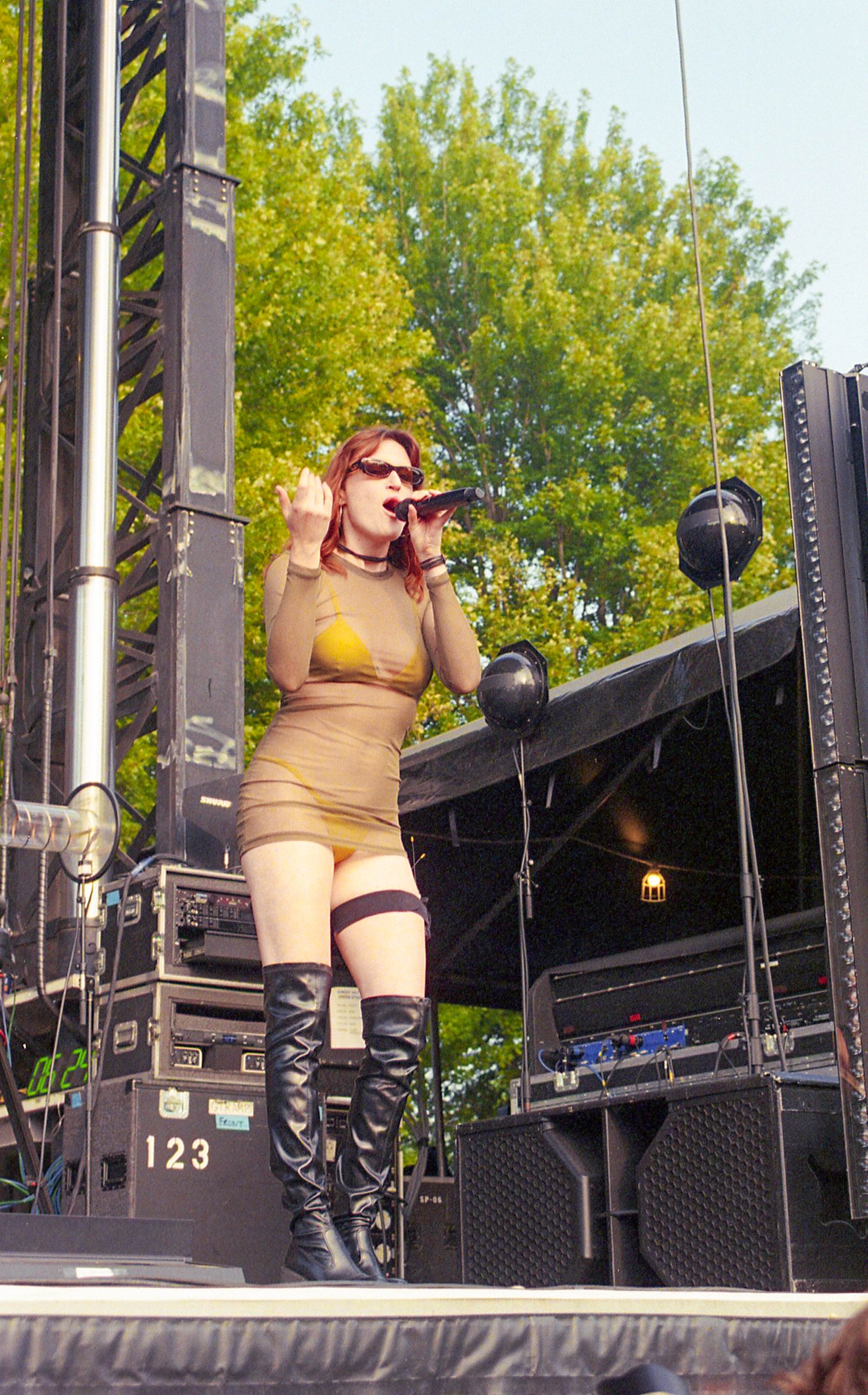

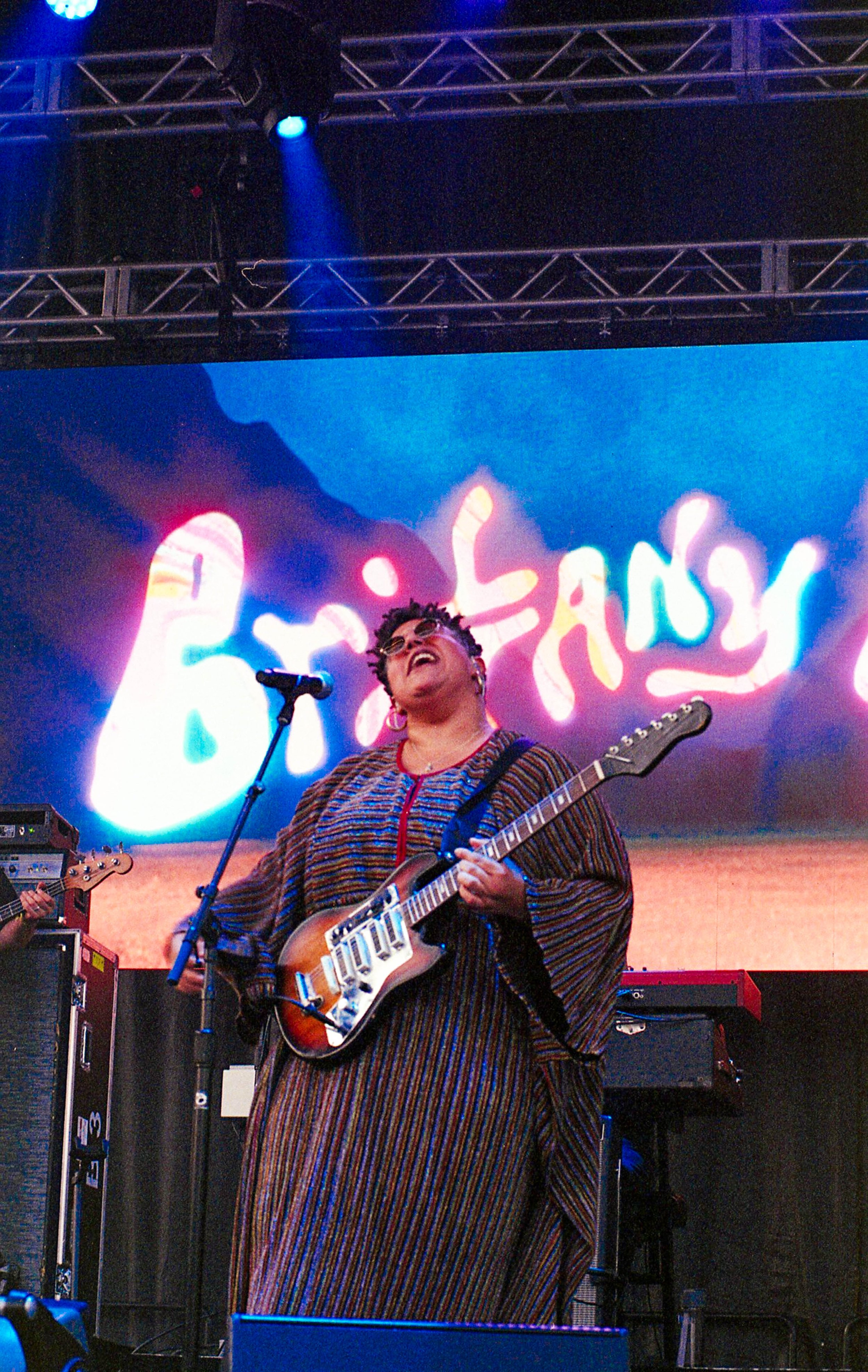
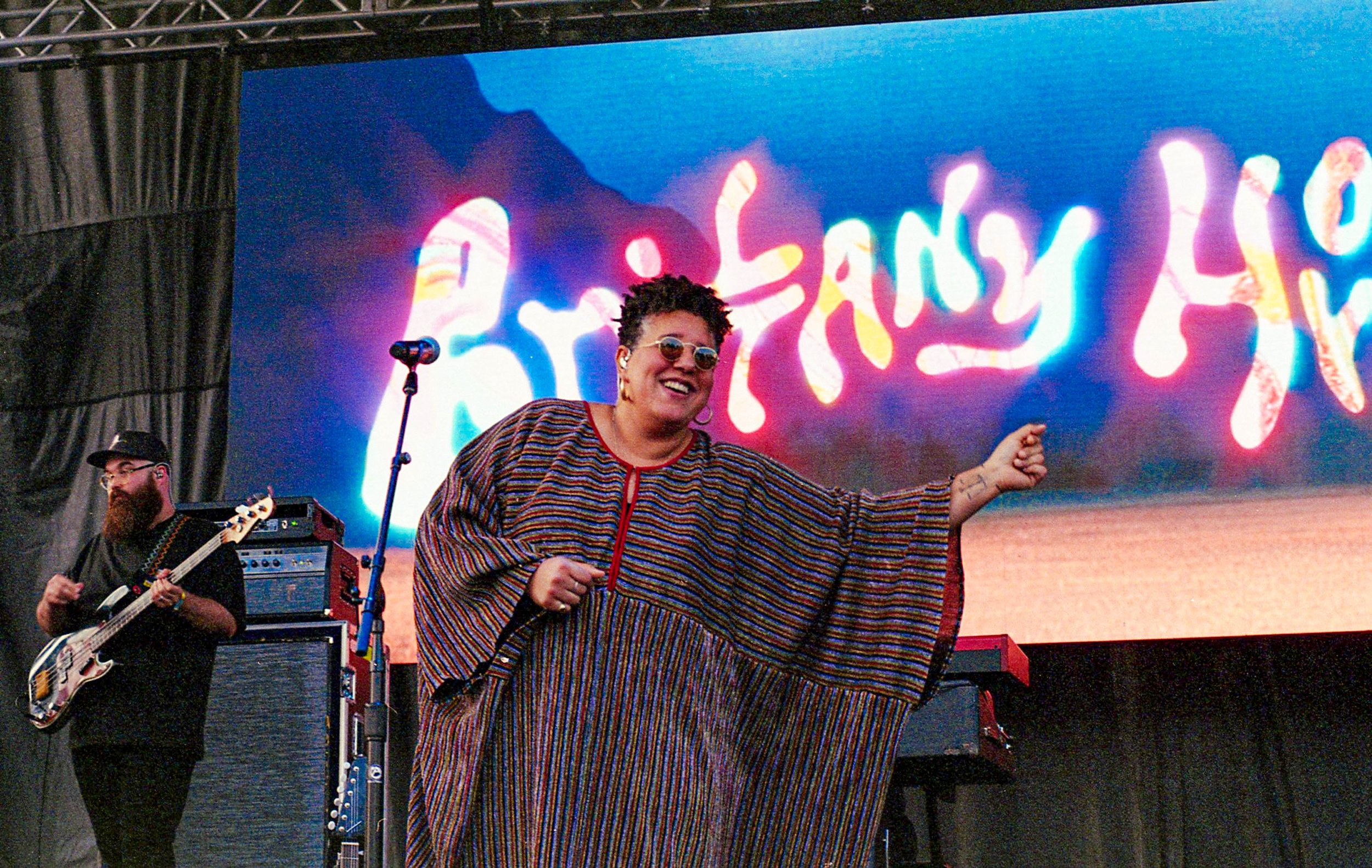
Day three started a little slower (because I’m in my thirties, and three days of music festing was beginning to take a toll), so we headed over to Union Park an hour or two after doors to catch glimpses of Joana Sternberg, Maxo, and Nala Sinephro.
I took a chance on Nala Sinephro from a friend’s recommendation as “a killer ambient artist,” which was enough to sell me. Although at my first Pitchfork Fest back in 2011, I caught ambient titan Tim Hecker on the Blue Stage, who played right around the golden hour while other, louder acts played on the mainstages, and I can’t say it was the perfect setting. Sinephro was much more than just drones, though; her band ran through spaced-out jazz and rhythmic electronic music as Sinephro alternated between harp and keyboards. It was a beautiful way to ease into day three, and I’m anxiously awaiting her new album in September.
– Logan Archer Mounts
Model/Actriz frontman Cole Haden started the band’s set by coming out, applying lipstick, then walking across the stage and posing with a purse before grabbing the mic. That was about all I saw before catching MUNA and Mannequin Pussy interviews on the side stage, which was a much chiller (and much needed) way to start the day on a relaxed note.
From there, Jessica Pratt brought some of the prettiest vibes of the whole fest, with everyone in the band sitting, so it really felt like an intimate, laid-back show you’d catch in a backyard or a beer garden. “I look like a pallbearer,” Jessica Pratt slyly says into the mic, dressed in all black, practically melting under the hot mid-July sun. Fortunately, that heat didn’t stop her from delivering an intimate set that the crowd enjoyed with a hushed tone during the full hour, giving Pratt the space to clear out for her brilliant storytelling and gorgeous melodies.
– David Williams
Mannequin Pussy started a few minutes late and dealt with a couple of technical difficulties, but they are true rock stars and ran through their scheduled set exactly as intended. Missy is probably one of the best front people in music right now, dancing, posing, and strutting across the stage without missing a growl. At one point, Missy asked all the boys in the audience to raise their hands because she “wanted to see what kind of fucked up dude would go to a Mannequin Pussy Show” then asked us all to scream “pussy” as loud as they could and simply replied “pathetic” when it wasn’t loud enough. She then asked the entire crowd to scream the same thing simultaneously because everything’s better together, right? They played all the hits off this year’s I Got Heaven and slammed all their one-minute punk tracks back-to-back toward the end of the setlist for a full-throttle injection of adrenaline that kept the pit in constant motion. Simply one of the best.
How many opportunities do you get to see a hip-hop pioneer live in the flesh? Grandmaster Flash is hip-hop’s Lewis and Clark, so this was a must-see set if only to see the face of the man who helped lay the groundwork for an entire genre. Grandmaster Flash was on DJ duty, spinning the 1s and 2s, keeping everyone’s energy up under the humid heat. Getting to hear the beat to “White Lines” live, one of the greatest straightedge anthems ever, was an absolute treat. Only second to Flash dropping in “Sweet Home Alabama” and then immediately shouting “FUCK A STATE TROOPER!” At the Visit Austin Interview stage, I got genuinely emotional listening to Flash talk about the birth of sampling and his “quick mix theory,” how he used to buy two copies of one record, mark them up with crayon to count how many times a record revolved with one beat loop, and switching between turntables to create the endless pattern. Also, he invented the turntable slipmat with the help of his seamstress mother because there was too much traction on his early decks for him to be able to do his scratching and backmasking. An absolute legend.
– Logan Archer Mounts
I generally think of MUNA as something not for me, but I’ll admit, watching the band bounce around the stage (and off each other) as the sun set was a pretty picturesque music festival experience. The songs started to blend together a bit toward the end of the set, but you know I had to show up and throw down for “Silk Chiffon.”
Care to witness a show based solely on chillwave vibes? Then look no further to the psychedelic rock group Crumb. Their song "AMAMA" was a personal favorite of mine, where it feels like you just get strapped in and feel the grooves from the jump. Whenever you see them, just know that they will have you swaying back and forth like one of those inflatable tubes you spot at random gas stations.
– David Williams
Les Savy Fav is exactly the type of band I want to see more of at Pitchfork. I grew up on 2000s indie rock, and even though Les Savy Fav wasn’t my most listened-to band of the time, I had always hoped they would get back out there after their hiatus began in the early 2010s. After an exhilarating performance on Riot Fest weekend in 2021, the NYC group brought the same energy back to Pitchfork, now on the heels of their excellent new album OUI, LSF. Like Model/Actriz earlier in the day, singer Tim Harrington spent most of the set in the audience, beginning minutes before the first note was even played by riding a Lime scooter around the crowd, then straight down the center to the barricade before jumping onto the stage. Harrington was covered in glitter with a neon-dyed hair/beard combo and a shirt that read “I’M JUST HAPPY TO BE HERE,” which was removed a few songs into the performance to reveal the same message scrawled onto his stomach. Whether they were playing their ten-week-old songs or their ten-year-old songs, Les Savy Fav was an uncontrollable ball of energy for the duration of their 45 minutes, raucously closing out the Blue Stage for the weekend.
– Logan Archer Mounts
Brittany Howard brought electronic-infused funk rock to the Red Stage on Sunday night, going deep into her seemingly endless bag of skills. She quarterbacked the entire set, using each instrument at various points and playing each one with the confidence and panache you would expect from someone of her caliber. She pulled off an effortless and joyous performance that felt like the perfect soundtrack as the sun wound down to night.
– David Williams
Finally, the inimitable Alanis Morissette closed out Sunday with a set that pulled heavily from Jagged Little Pill in addition to tracks from her entire repertoire, sometimes only playing a verse and a chorus of a song as a transition between two others. It felt theatrical, with potential inspiration from her Jagged Little Pill musical that’s been running the last few years. She had the crowd wrapped around the hand in her pocket the entire time; her voice is still absolutely unreal, and watching her close out such a fantastic and full weekend was special.
